The MSN Specialty Track FNP
- Preparedness for leadership roles and direct patient care in varied settings;
- Preparedness for clients education;
- Preparedness for ordering therapeutic interventions and medication.
A graduate family nurse practitioner should be prepared for leadership roles and patient care in clinical settings such as emergency care offices and ambulatory clinics and in private care centers. In addition, this specialist should be ready to educate patients about their diseases and follow-up medication outside the medical facility. Besides, one should be well-prepared for ordering high quality therapeutic interventions and medication.
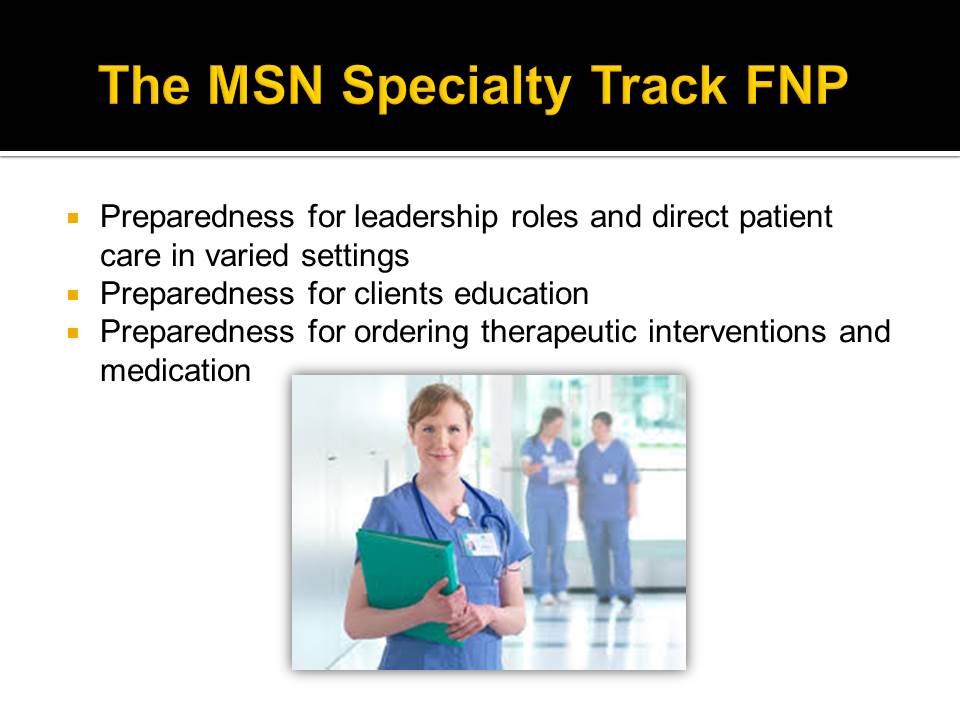
FNP Leadership Roles
FNP performs the following roles as the leader in the collective body of nurses:
- assessing, planning, implementing and evaluating the incoming data;
- consideration of legal and ethical issues;
- documentation and administration;
- coordination of ancillary and technical staff;
- contribution to the science of nursing;
- promotion of professional growth of others.
FNP performs the following roles as the leader in the collective body of nurses:
- assessing, planning, implementing and evaluating the incoming data;
- consideration of legal and ethical issues;
- documentation and administration;
- coordination of ancillary and technical staff;
- contribution to the science of nursing;
- promotion of professional growth of others.
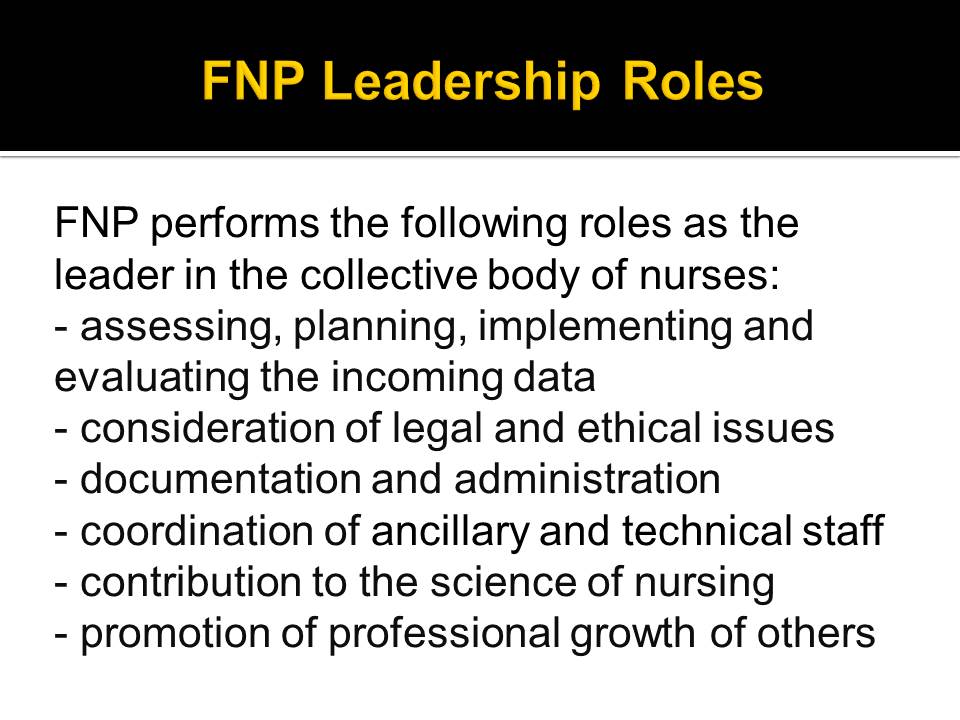
FNP Direct Patient Care
FNP performs the following roles as a patient caregiver:
- managing the overall care of people with mental illnesses;
- developing the plan of care;
- provision of therapeutic treatment;
- provision of comprehensive care including mental and physical state assessment.
FNP performs the following roles as a patient caregiver:
- managing the overall care of people with mental illnesses;
- developing the plan of care for the patients entrusted to hi or her;
- provision of therapeutic treatment;
- provision of comprehensive care including mental and physical state assessment.
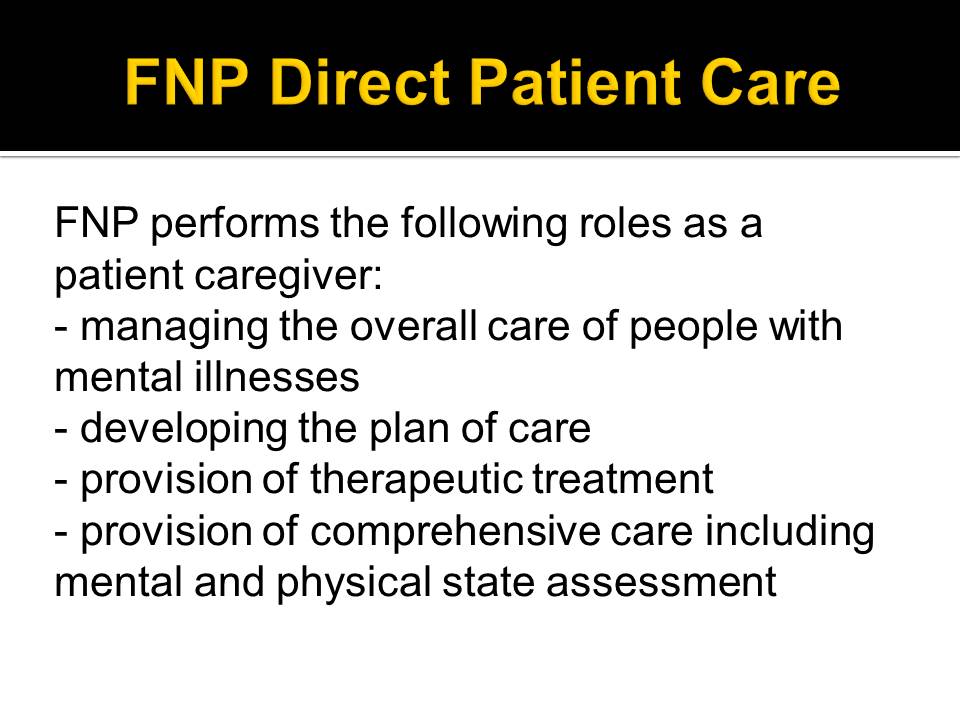
FNP Clients Education
- Provision of general information regarding the medication and illnesses to patients;
- Provision of recommendations to the family members of a patient;
- Informing patients about the ways to acquire more knowledge concerning their condition and preventive measures;
- Informing community about possible outcomes of dealing with a mental illness.
FNP provides general information regarding the medication and illnesses to patients in order to help them cope with the new circumstances in their lives. Besides, the specialist provides recommendations to the family members of a patient to help them adjust to the needs of their loved one affected by a mental illness. Also, FNP informs patients about the ways to acquire more knowledge concerning their condition and preventive measures. Finally, one informs community about possible outcomes of dealing with a mental illness.
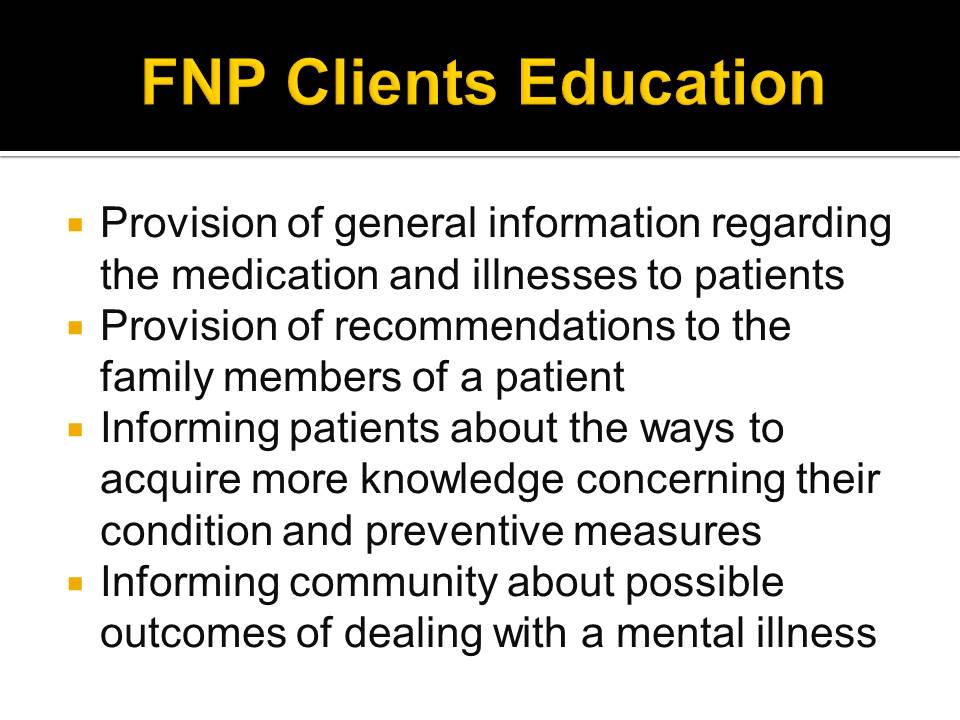
The AACN Essentials Skills Application to Psychiatric-mental Health Nursing
- Patient privacy and confidentiality protection;
- Successful partnership with family members;
- Patient support and patient care facilitation.
A master’s prepared nurse will apply the AACN Essentials Skills in psychiatric-mental health nursing in the following ways:
- patient privacy and confidentiality protection;
- successful partnership with family members;
- patient support and patient care facilitation.
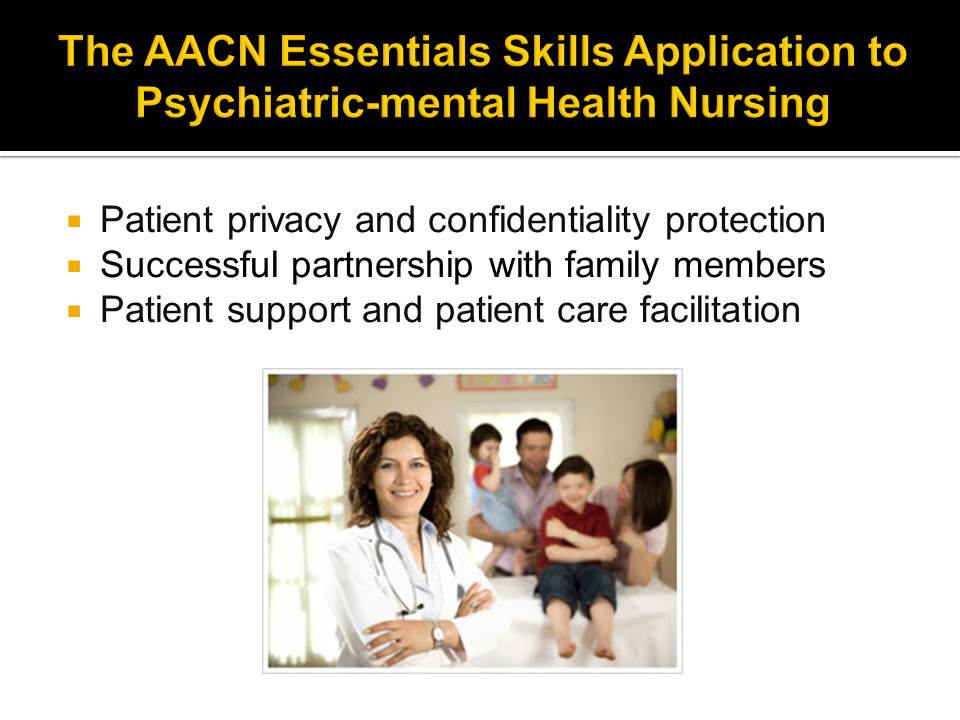
Patient Privacy and Confidentiality Protection
The AACN Essentials skills implicate the implementation of exalted ethical and moral standards by the healthcare professionals.
To implement the AACN Essentials skills in nursing practice, a mental health care professional should mind the following rights of a patient:
- Right to confidentiality;
- Right to informed consent;
- Right to keep personal items.
The AACN Essentials skills implicate the implementation of exalted ethical and moral standards by the healthcare professionals. To implement the AACN Essentials skills in nursing practice, a metal health care professional should mind the following rights of a patient:
- right to confidentiality;
- right to informed consent;
- right to keep personal items (Daggett, Butts & Smith, 2002).
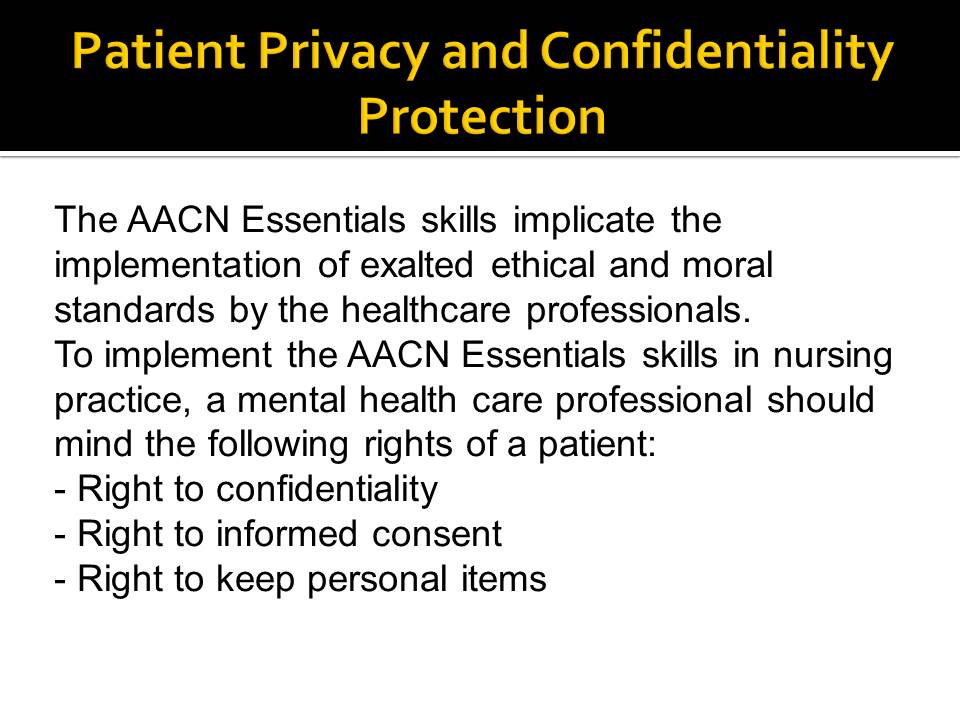
Patient Right to Confidentiality
In order to meet the standards set by the AACN, a nurse should strive to protect clients medical records as well as any information revealing the facts about his or her mental health condition. Client’s private information cannot be disclosed neither to public representatives nor to common people.
In order to meet the standards set by the AACN, a nurse should strive to protect clients medical records as well as any information revealing the facts about his or her mental health condition. Client’s private information cannot be disclosed neither to public representatives nor to common people (Grabowski, Aschbrenner, Rome & Bartels, 2010).
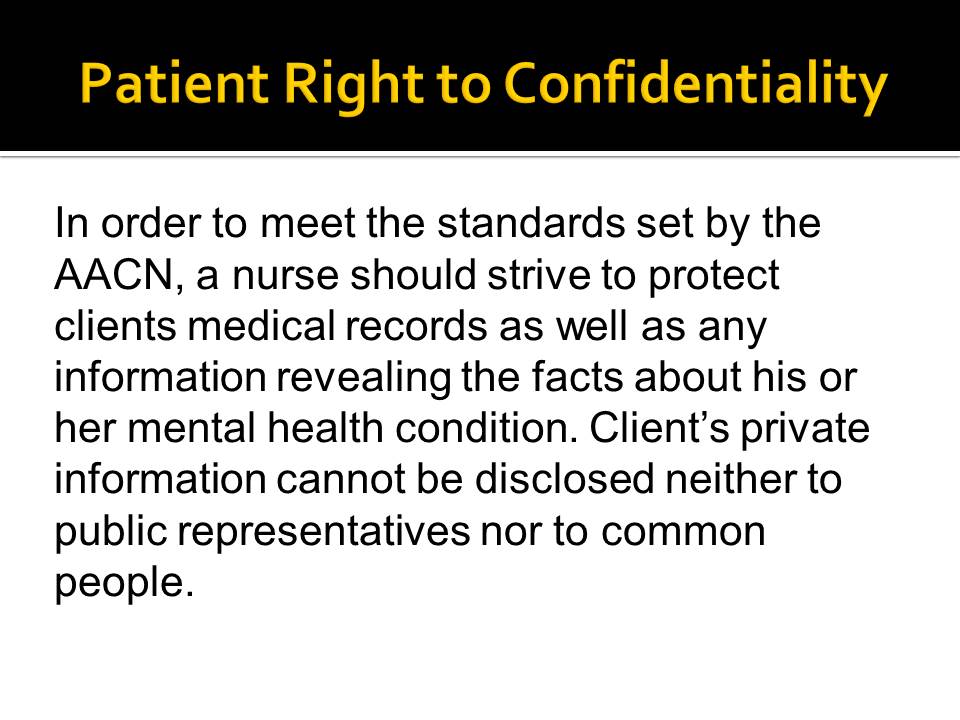
Patient Support and Patient Care Facilitation
Mental care incorporates both physical and mental health care. Physical healthcare assumes giving the prescribed medications. Mental health care goes beyond drug treatment since patients with mental illnesses also need non-medical therapy such as cognitive-behavioral therapy or sports based therapy.
Mental care incorporates both physical and mental health care. Physical healthcare assumes giving the prescribed medications. Mental health care goes beyond drug treatment since patients with mental illnesses also need non-medical therapy such as cognitive-behavioral therapy or sports based therapy (Grabowski, 2010).
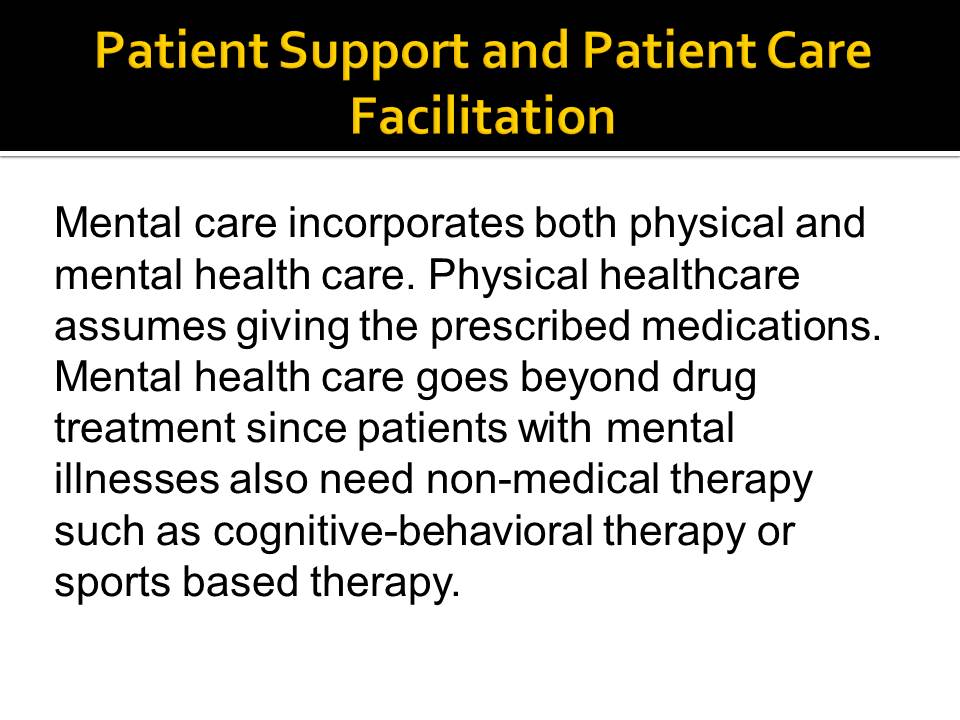
The Core Ethical Values in Patient Care
- Human dignity;
- Altruism;
- Integrity;
- Social justice;
- Privacy and confidentiality.
The core ethical values in patient care in psychiatric-mental health nursing are the human dignity, altruism, integrity, social justice, and maintaining privacy and confidentiality of a patient.
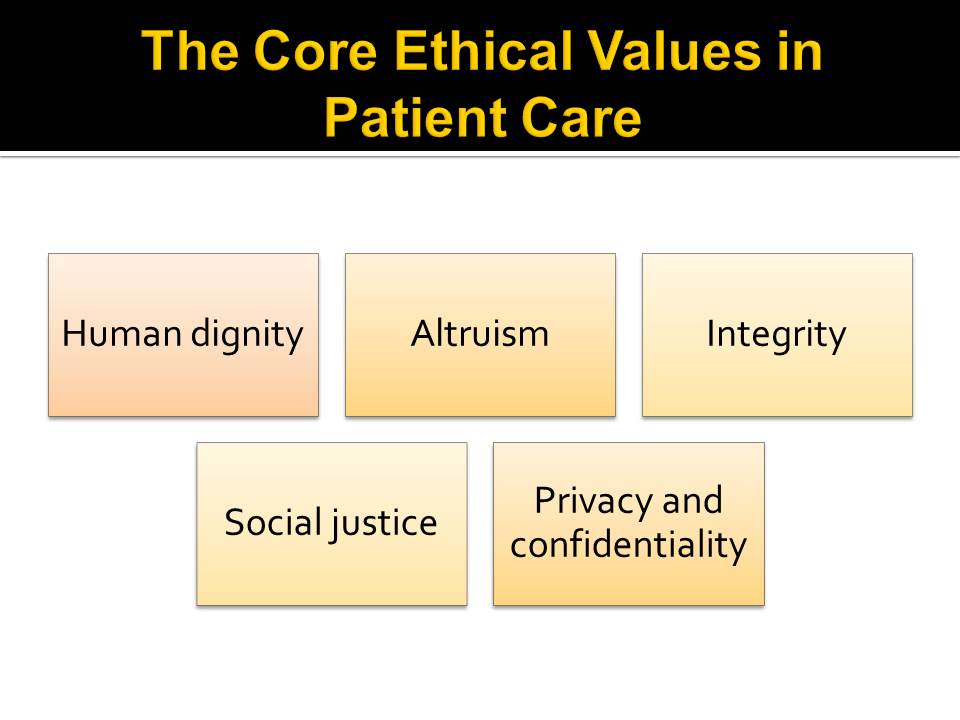
The Use of the AACN Essentials Skills in Psychiatric-mental Health Nursing
A master’s-prepared nurse in psychiatric-mental Health Nursing will implement the the AACN Essentials skills by:
- promoting wellness and health of body, mind, and spirit of a patient;
- facilitating effective work of the nursing personnel in clinic setting;
- collaborating with all the participants of the medical process.
A master’s-prepared nurse in psychiatric-mental Health Nursing will implement the the AACN Essentials skills by promoting wellness and health of body, mind, and spirit of a patient; facilitating effective work of the nursing personnel in clinic setting; and collaborating with all the participants of the medical process (Grabowski, 2010).
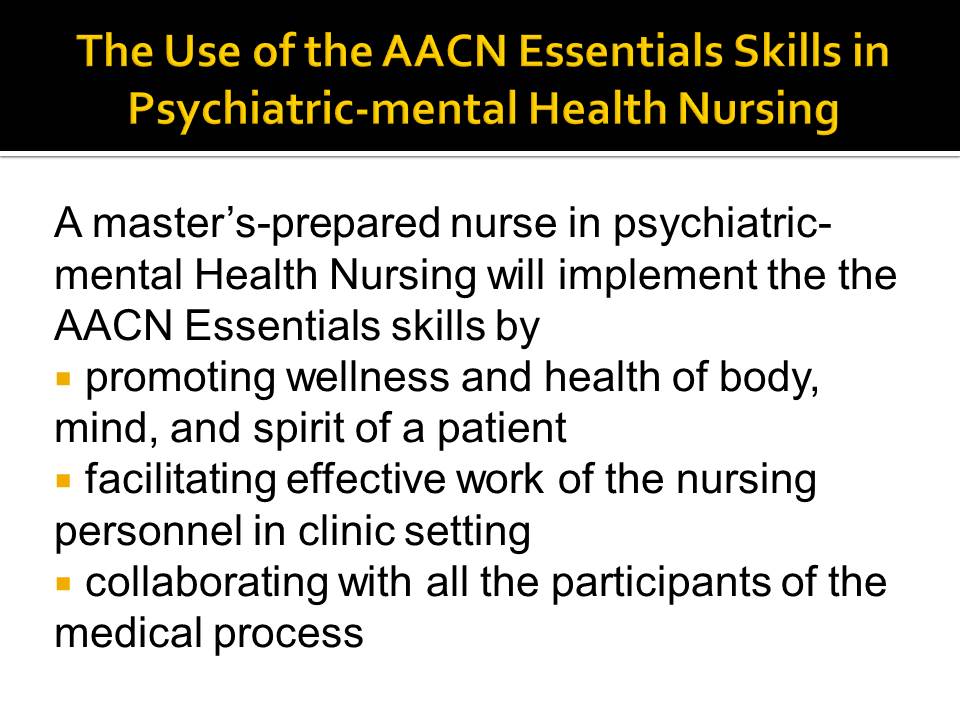
The Main Components of the AACN Essentials Skills in Psychiatric-mental Health Nursing
The AACN Essentials Skills in Psychiatric-mental Health Nursing:
- Core Nursing knowledge:
- Professional Nursing Development;
- Professional Nursing Development;
- Professional Nursing Development.
The main components of the AACN Essentials Skills in psychiatric-mental health nursing are the core nursing knowledge, the professional nursing development, the professional nursing development, and the professional nursing development.
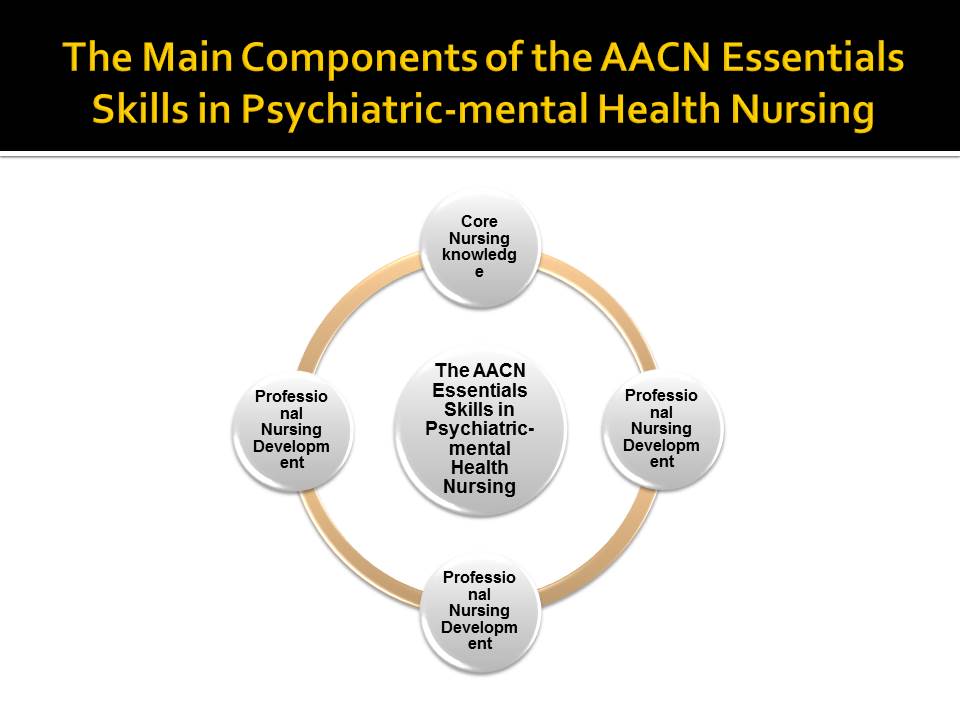
Concluding Statements
The skills outlined in the AACN Essentials are well-applicable in psychiatric-mental health nursing. Generally, nurses working in this field should strive to implement the AACN Essentials by strengthening leadership skills, expanding the knowledge of ethical implications in the profession, and increasing knowledge regarding the use of people-centred approach in patient care.
The AACN Essentials are applicable the following areas of mental health care:
- Patient privacy and confidentiality protection;
- Partnership with family members;
- Patient support and care facilitation;
- Concluding Statements (continuation).
In mental care nursing, a specialist implements the AACN Essentials skills by:
- providing assessment to patients;
- providing recommendations to patients;
- facilitating effective medications to patients;
- educating family members of a patient;
- implementing ethical standards in the work with patients.
A master’s-prepared nurse in psychiatric-mental Health Nursing will become a leader in the organization of medical process.
One will aim to promote professional growth of every member of the team and facilitate effective collaboration between all the participants of the treatment process.
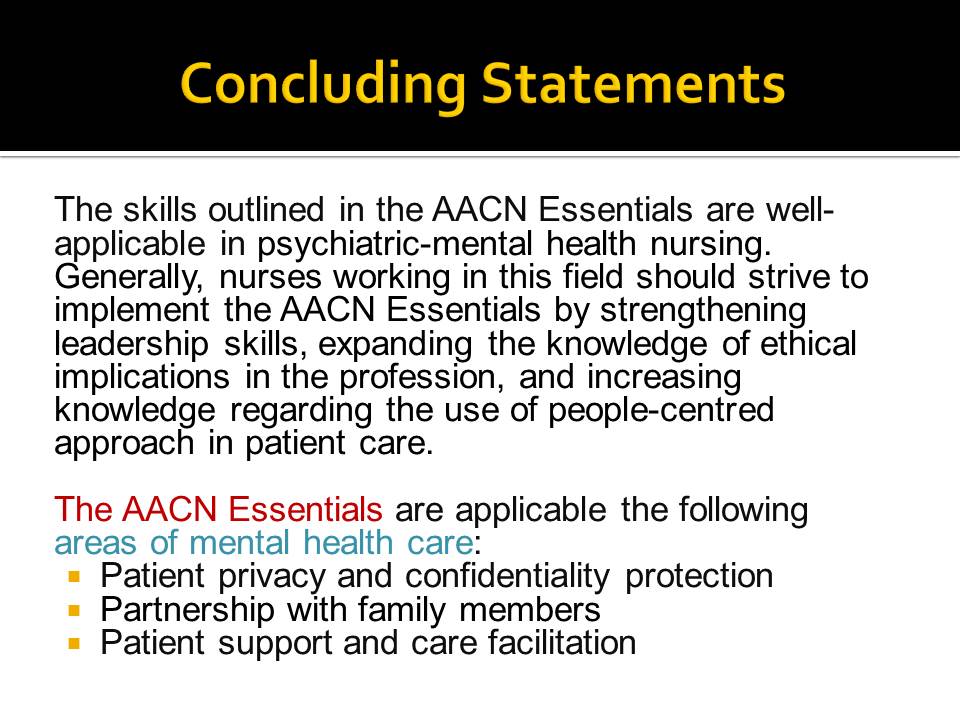
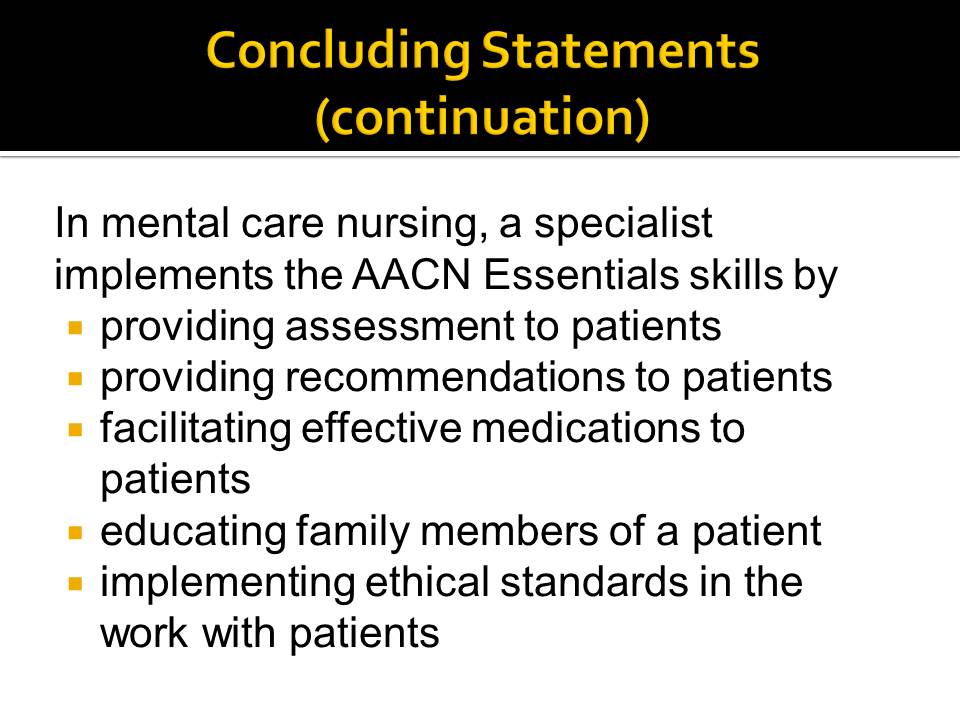
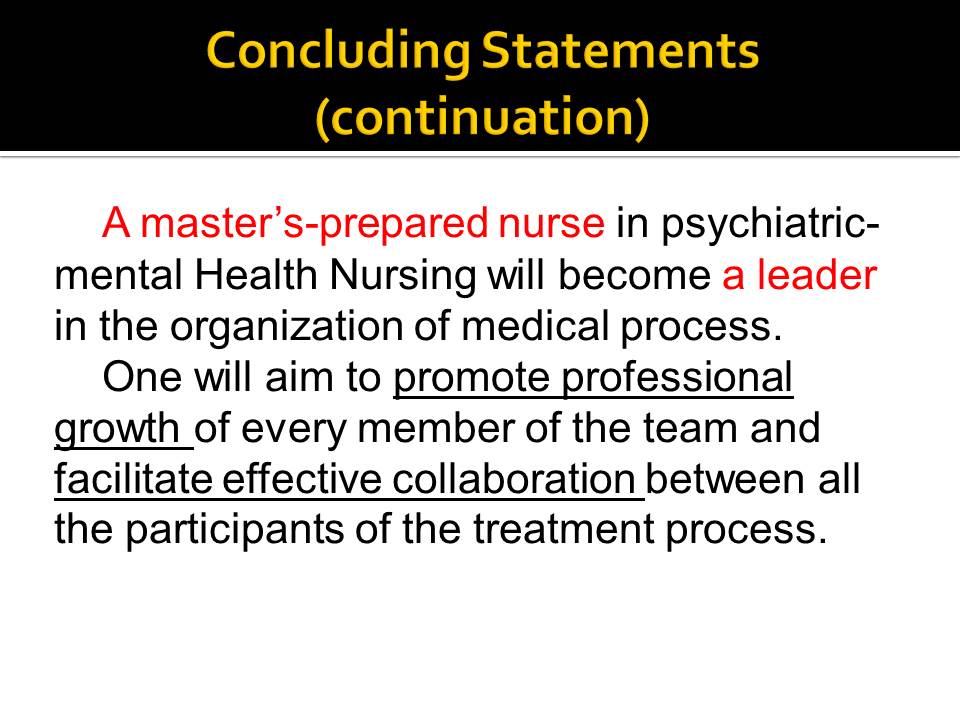
References
Daggett, L., Butts, J., & Smith, K. (2002). The development of an organizing framework to implement AACN guidelines for nursing education. Journal of Nursing Education, 41(1), 34-37.
Grabowski, D., Aschbrenner, K., Rome, V., & Bartels, S. (2010). Review: Quality of mental health care for nursing home residents: A literature review. Medical Care Research and Review, 67(6), 627–656.